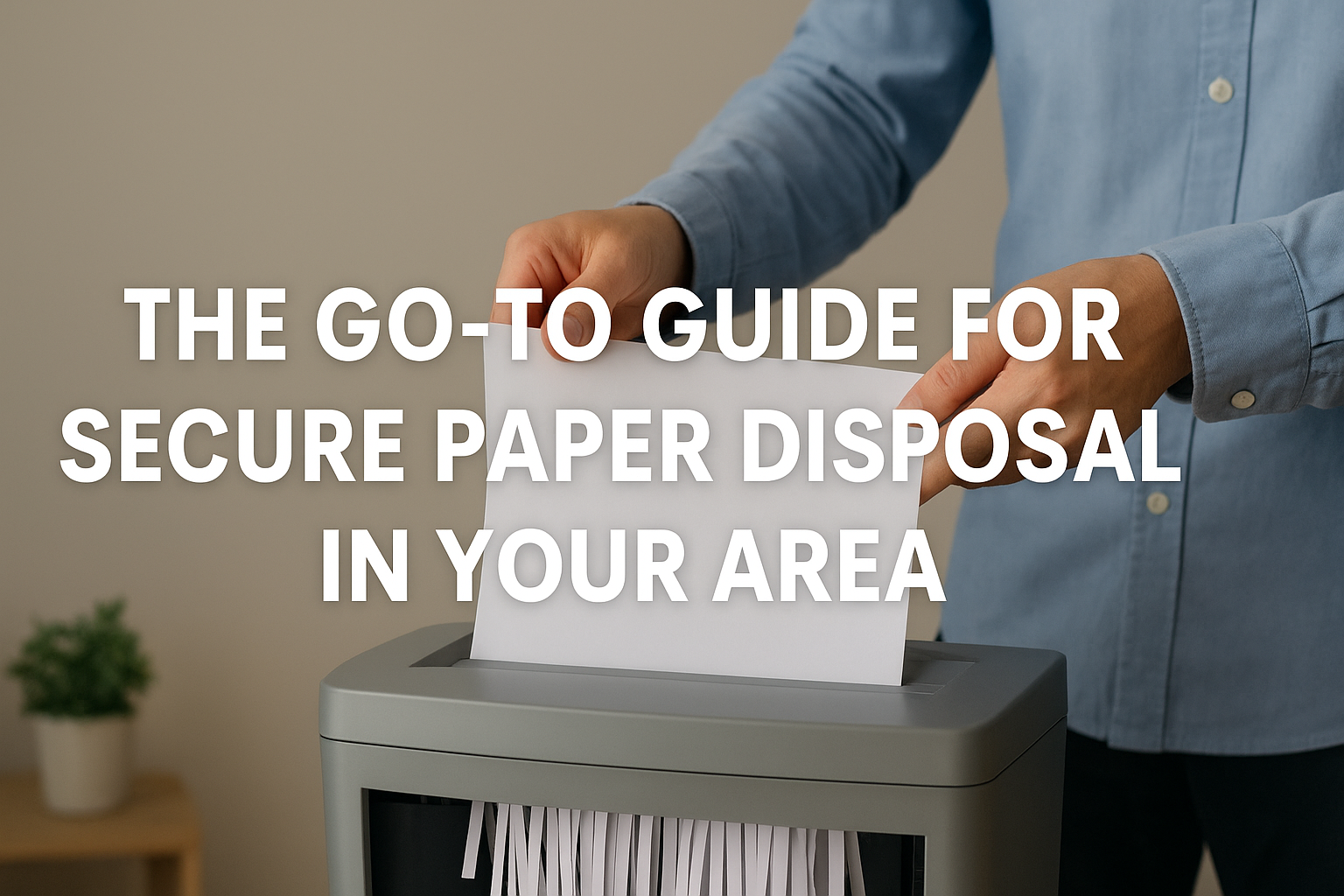The Go-To Guide for Secure Paper Disposal in Your Area

Identity theft is on the rise, and discarded documents often become the easiest target. Secure paper disposal in your area is more than just decluttering—it’s about protecting your personal and business information. This guide walks you through safe disposal methods, local options, and cost-effective solutions.
Why Secure Paper Disposal in Your Area Matters
Sensitive papers like bank statements, tax forms, and medical records carry private details. If left in the trash, these can easily be misused. Choosing the right disposal method not only safeguards your identity but also contributes to environmental sustainability.
Best Practices for Secure Paper Disposal in Your Area
-
Use shredding services: Many towns offer on-site and off-site shredding solutions.
-
Check recycling rules: Some recycling centers require shredded paper to be bagged separately.
-
Adopt regular cleanouts: Don’t let paperwork pile up—schedule monthly or quarterly disposal sessions.
Local Shredding Services and Drop-Off Centers
Every community has unique solutions. Many local office supply stores partner with shredding providers. In some areas, banks and credit unions also arrange safe document disposal days for customers.
How to Find Secure Paper Disposal Near You
-
Search for “shredding services near me” to locate providers.
-
Contact your local waste management office for approved disposal centers.
-
Ask local libraries or community centers—they sometimes host free paper shredding days.
Community-Based Secure Paper Disposal in Your Area
Neighborhood associations often collaborate with shredding companies to offer affordable or free disposal days. These initiatives not only protect residents but also encourage community participation in safe recycling.
Secure Paper Disposal for Businesses in Your Area
Businesses handle far more sensitive data. Secure disposal prevents legal troubles and ensures compliance with privacy regulations. Many providers offer scheduled pickups, locked bins, and certificates of destruction for peace of mind.
Eco-Friendly Secure Paper Disposal Options
Secure shredding doesn’t have to harm the environment. Many shredding companies recycle paper after destruction. Ask your provider if they follow eco-friendly practices to align your security with sustainability.
Benefits of Attending Local Shredding Events
Shredding events save time, money, and effort. They offer bulk disposal at once, which is especially helpful for households with years of accumulated paperwork. Some events even accept old hard drives or electronics.
Paper Shredding Events Guide
Your local Paper Shredding Events Guide can help you keep track of upcoming opportunities. These guides are usually published by municipalities, banks, or community associations and are worth bookmarking.
How to Prepare Documents for Secure Disposal
-
Remove binders, clips, and staples unless your provider allows them.
-
Sort documents into categories for faster processing.
-
Store papers in sturdy boxes or bags to avoid last-minute chaos.
Tips to Avoid Identity Theft Through Proper Disposal
-
Always shred anything with your name, address, or account numbers.
-
Don’t keep old checks, expired credit cards, or utility bills.
-
Store sensitive papers securely until you dispose of them.
Residential Secure Paper Disposal in Your Area
Households often underestimate how much sensitive information they throw away. Old letters, insurance statements, and even junk mail can contain personal identifiers. Secure paper disposal in your area helps families reduce risks while staying organized. Many local waste services now provide shredding bins or schedule seasonal community events where residents can bring documents for safe destruction. This option is convenient, affordable, and ensures personal records don’t end up in the wrong hands.
On-Site vs. Off-Site Shredding Options
If you’re exploring professional shredding services, you’ll notice two main options: on-site shredding and off-site shredding.
-
On-site shredding: A mobile shredding truck visits your location, and you can watch the process happen instantly. This offers the highest level of security and transparency.
-
Off-site shredding: Your documents are collected and transported to a secure facility where they are shredded in bulk. While slightly less immediate, this option is often more cost-effective for larger volumes.
Both services provide a certificate of destruction, which gives you proof that your documents were handled properly.
Cost of Secure Paper Disposal in Your Area
Prices vary depending on whether you need one-time or ongoing service. For residential customers, community shredding days may be free or charge a small per-box fee. Businesses often set up scheduled pickups with a provider, which can range from $40–$100 monthly depending on volume. Before choosing, compare local providers and check if your municipality already offers affordable disposal options.
Secure Paper Disposal and Compliance
For businesses, secure disposal isn’t just a safety practice—it’s often a legal requirement. Laws like HIPAA, FACTA, and GDPR mandate proper handling of sensitive records. Secure paper disposal in your area ensures companies remain compliant, avoid fines, and maintain customer trust. Providers usually supply locked bins for offices and perform regular pickups, making the process seamless.
Recycling After Secure Disposal
A big advantage of shredding is that it supports sustainability. Most shredded paper gets sent to recycling facilities where it’s turned into new products such as packaging materials or tissue paper. By choosing secure paper disposal in your area, you’re protecting your information while also contributing to a greener planet. Always confirm that your shredding provider partners with certified recycling facilities.
Frequently Asked Questions
What types of documents should always be shredded?
Anything with personal identifiers—bank statements, tax forms, pay stubs, and medical bills—should be shredded before disposal.
Are shredded papers recyclable?
Yes, but some recycling centers require them to be bagged separately. Always check local guidelines.
Do banks offer secure paper disposal services?
Many banks and credit unions organize annual or seasonal shredding days for their customers.
Is home shredding safe enough?
Home shredders work well for light use, but for bulk disposal or highly sensitive information, professional services are more secure.
How often should I dispose of old documents?
A quarterly schedule works well for most households. Businesses may require weekly or monthly services.
What if I don’t have a shredder at home?
You can use local shredding events, office supply store services, or community drop-off centers.
Conclusion
Secure paper disposal in your area is an essential step toward protecting your privacy and staying eco-friendly. Whether you choose professional shredding services, attend community events, or follow your local Paper Shredding Events Guide, the goal remains the same—keeping your sensitive data out of the wrong hands. By taking proactive steps, you can stay secure while contributing to a cleaner environment.
check home page.



